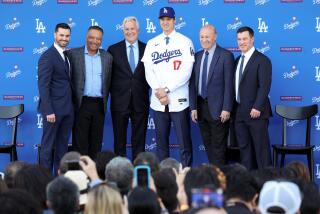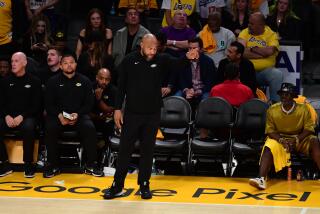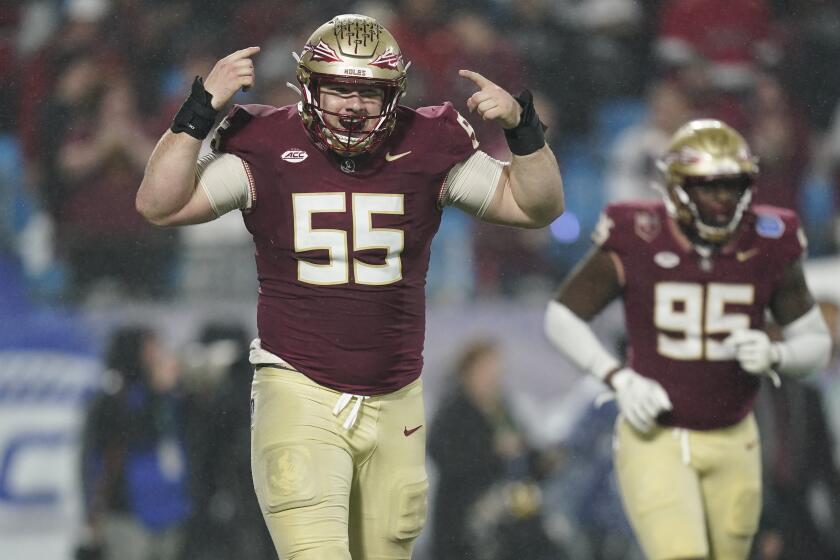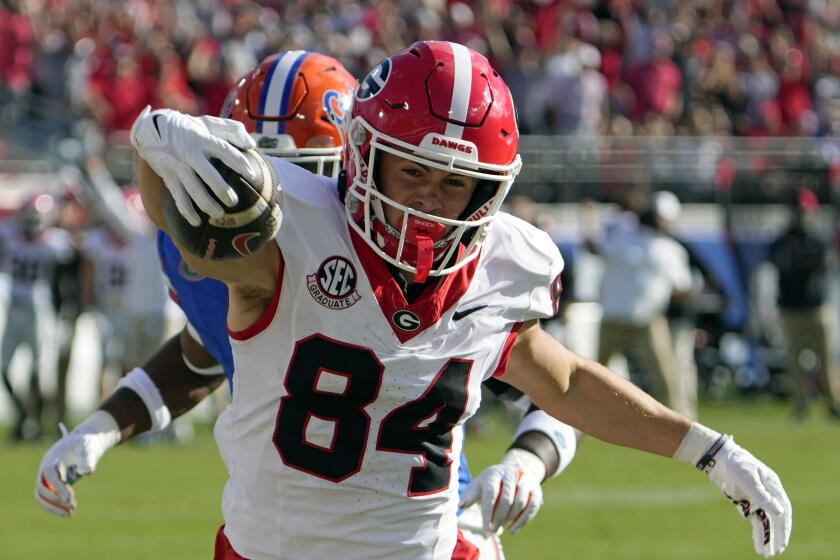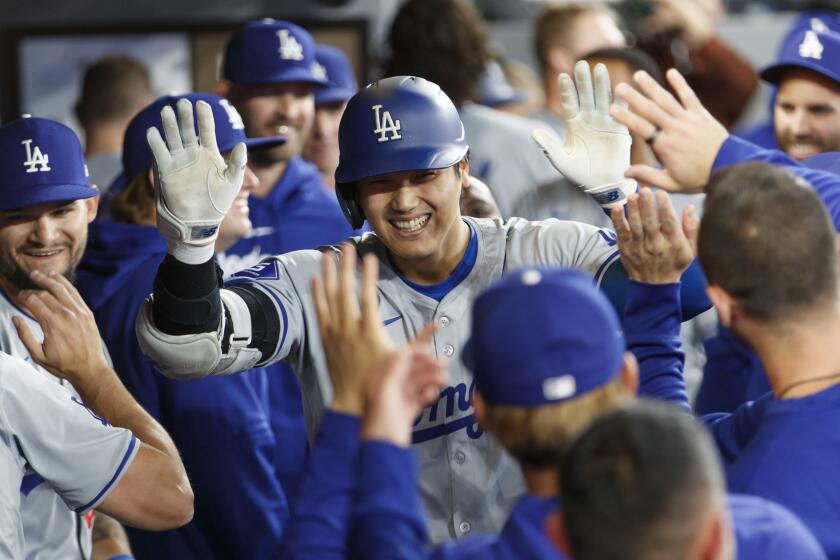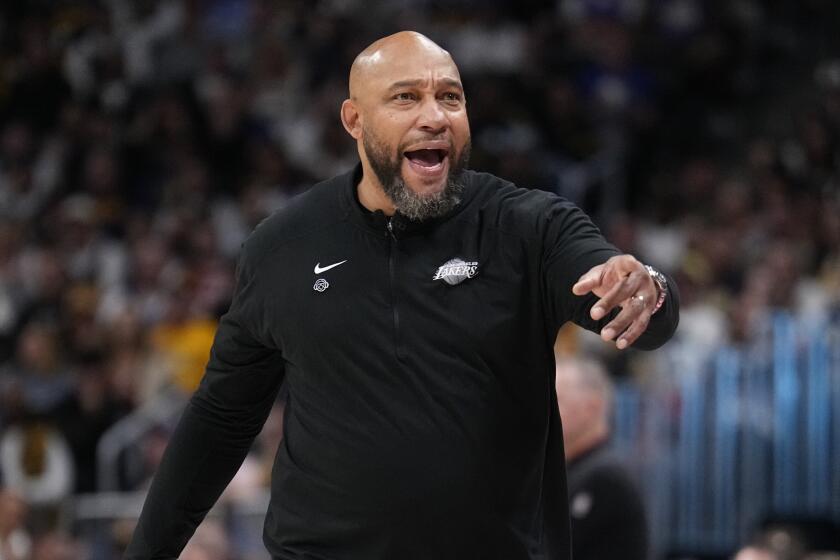Gousha Gets Back in Gear After a Bout With Hodgkin’s : Baseball: USD catcher bounces back after surgery, radiation treatment.
Sean Gousha spent part of three hours Thursday afternoon squatting behind home plate during a 5-3 victory over Cal State Los Angeles. He spent parts of the other half hustling around the base paths, the result of a double in the gap, a walk and an error. He would have made it on base a fourth time, but the pitcher’s glove accidentally got in the way of his hardest hit ball of the day.
For good measure, he stole two bases.
Gousha, the 6-foot-4 junior catcher for the University of San Diego, was understandably tired and sore. His tender right shoulder required an ice pack, and the right knee on his uniform pants had a two-inch tear surrounded by a blood stain.
Gousha, always thin but now even more so after a recent bout with Hodgkin’s disease, wanted nothing more than to wallow in a hot bath and crawl into bed.
His sister’s puppy, however, had other plans. Stormy had waited patiently for a chance to scamper around the field. Stormy would not be denied.
The young golden Labrador retriever pounced on Gousha, who was lounging on the grass, and began gnawing at his stirrups. Moments later, his victim conquered, Stormy mustered a few not-so-ferocious yaps and began licking Gousha’s face and neck.
Neither could have been more content. The dog had his day, and so had Gousha.
Seven months ago, Gousha didn’t have the strength to play with a dog, let alone catch for a Division I baseball team.
Seven months ago, Gousha was losing hair and weight after going through two operations and radiation treatment for the life-threatening lymphatic disease.
“The radiation just kills your appetite and drains you physically,” said Gousha, who lost 30 pounds in about a month last summer. “Half the time I had to force something in me just to keep from wasting away.”
But Gousha’s attitude and zest for life never deteriorated.
“Personally, as a father,” Ron Gousha said, “I’m proud and impressed with how well he handled everything.”
Gousha said he is indebted to his family, teammates and coaches.
“I owe a lot of thanks to those guys, especially Coach (John) Cunningham,” Gousha said.
Although doctors can’t guarantee anything, Gousha appears to have recovered.
“I have to go for checkups every three months for the next five years,” Gousha said. “By then, they’ll know if it’s completely gone. Right now, the doctors seem to think everything’s going really well.”
As a sophomore at Orange Glen High, Gousha noticed a small lump in his throat. He was examined during his junior year, and the doctor thought it was a case of swollen glands. The doctor prescribed medication, which helped reduce the swelling but never eliminated it.
“The presumption at the time was that it was more Sean not taking his medication than it being something else,” said Ron Gousha, Sean’s father. “Every time he took the medication reguarly, the swelling went down.”
Three years passed before Gousha was re-examined in February, 1990. The diagnosis this time was Hodgkin’s disease.
“It was scary,” Gousha said. “You always think you’re not the one that’s going to get cancer.”
A week later, surgery was performed to remove the lump in his throat.
The doctors then informed Gousha his spleen probably would have to be removed, and he might have to undergo radiation treatment. The sooner the better, doctors told him.
But Gousha, who started 53 of USD’s 54 games as a freshman and was the Toreros’ rookie of the year, wanted to finish his sophomore year. He requested the surgery be delayed until after the season. His doctors and parents advised against it, but Gousha eventually got his wish.
“My feeling was to have it done as soon as possible,” Ron Gousha said. “But there was no question in my mind that Sean was going to play the rest of the season.”
Outfielder Devin Bundy, Gousha’s roommate and one of only a few, including Cunningham, who knew of Gousha’s condition, said Gousha handled the situation admirably. But there were times . . .
“I think he was downright angry with it all,” Bundy said. “He was overloaded with information. Everybody was giving him books and pamphlets and telling him what he should or shouldn’t do. All Goush wanted to do was keep playing baseball.”
Gousha played in 52 of USD’s 56 games. He batted .265 and had a .439 on-base percentage and a .962 fielding percentage.
At first, he didn’t want to tell the team what he had. “I didn’t want them to baby me,” he said.
After a couple of weeks, he relented, and teammates were stunned.
“Coming out here, seeing him play, you’d have never known he had anything,” pitcher Tommy Cheek said. “The way he handled that was just incredible.”
On May 29, Gousha had his spleen removed. Traces of the cancer had spread to other parts of his body, necessitating radiation treatment.
“Of all things, I think that was the most negative part of it for him,” Ron Gousha said. “He kind of sensed his mortality then. Everything else, he had kind of cakewalked through, so to speak.”
Going to treatment--daily for five weeks, a two-week break and daily for four weeks--took its toll on Gousha, who before the illness had a good shot at being selected in the 1991 June amateur draft.
“When he got back to school,” Bundy said, “he was down 30 pounds. Just battling every day. He was always skinny, but he looked like one of our fungo bats.”
Slowly, Gousha regained weight and strength, wanted to make it back by the start of the season Jan. 31.
Though admittedly not at full strength, Gousha has played in 30 of 32 games this season. He hit his first career home run almost a year to the day after he was first diagnosed. He’s hitting .227 with six RBIs.
“I don’t care what people think about his numbers,” Bundy said. “His just being out here has helped this team. There’s nobody else that can do what he does. Goush runs the show out here, and he’s a positive influence on everyone.”
Of his production, Gousha said, “It’s been a frustrating year so far. I think I lost a little bit from not being as physically strong. I think I’ve taken a step back.”
The mental part of it has been equally strenuous. He can’t forget the disease.
Every time he shaves, he can’t help but notice the one-inch scar on his neck. He has another reminder in the six-inch scar.
“I never really thought about being mentally tired until a few weeks ago,” he said. “Maybe that’s affecting my play.”
Cunningham agreed.
“The feistiness he has that he used to fight the Hodgkin’s thing has probably hurt him in his play,” he said. “Since he isn’t as strong as he was, he can’t do some of the things he normally would. He just needs to get back to the fundamentals. I think he’s started to do that.
“If (Thursday) was any indication, I think he’ll be fine.”
More to Read
Get our high school sports newsletter
Prep Rally is devoted to the SoCal high school sports experience, bringing you scores, stories and a behind-the-scenes look at what makes prep sports so popular.
You may occasionally receive promotional content from the Los Angeles Times.
